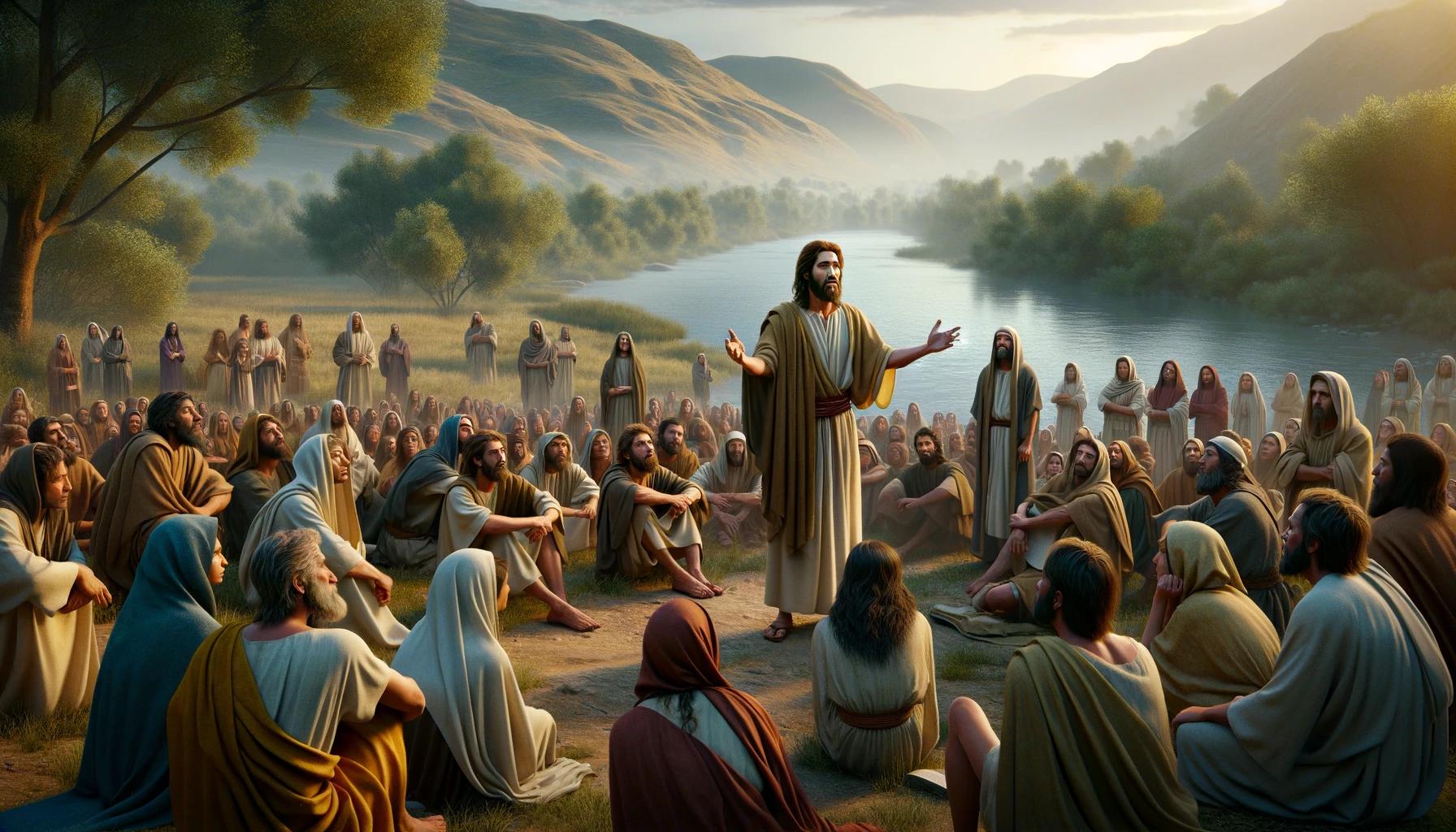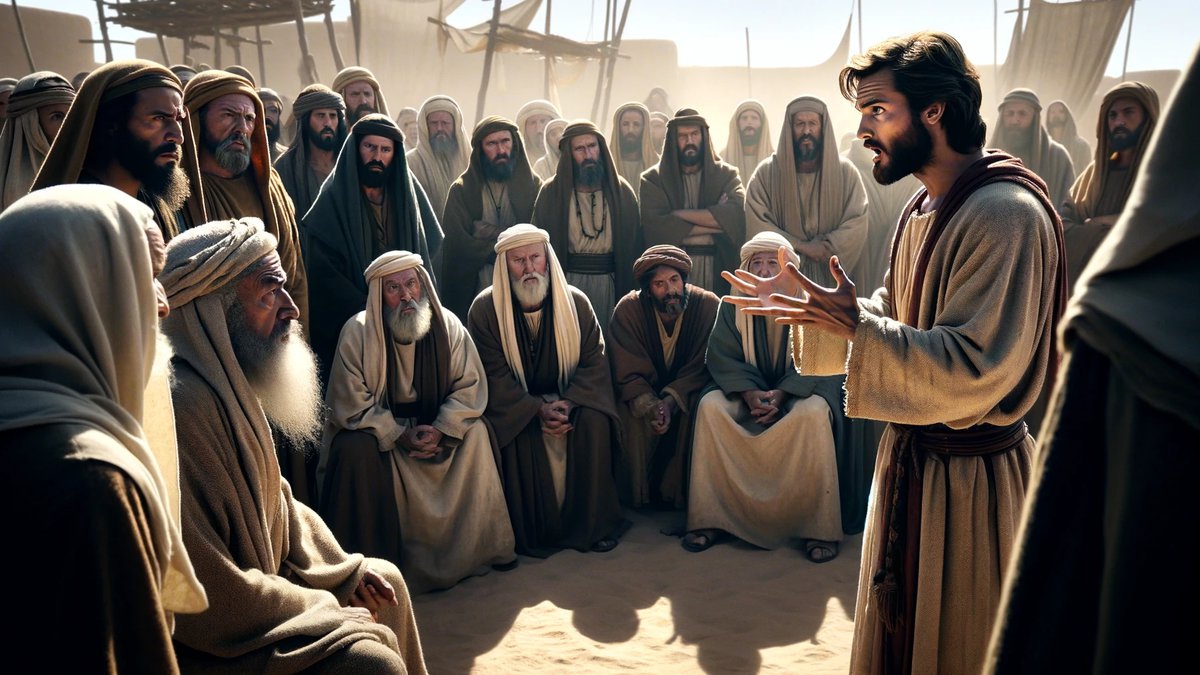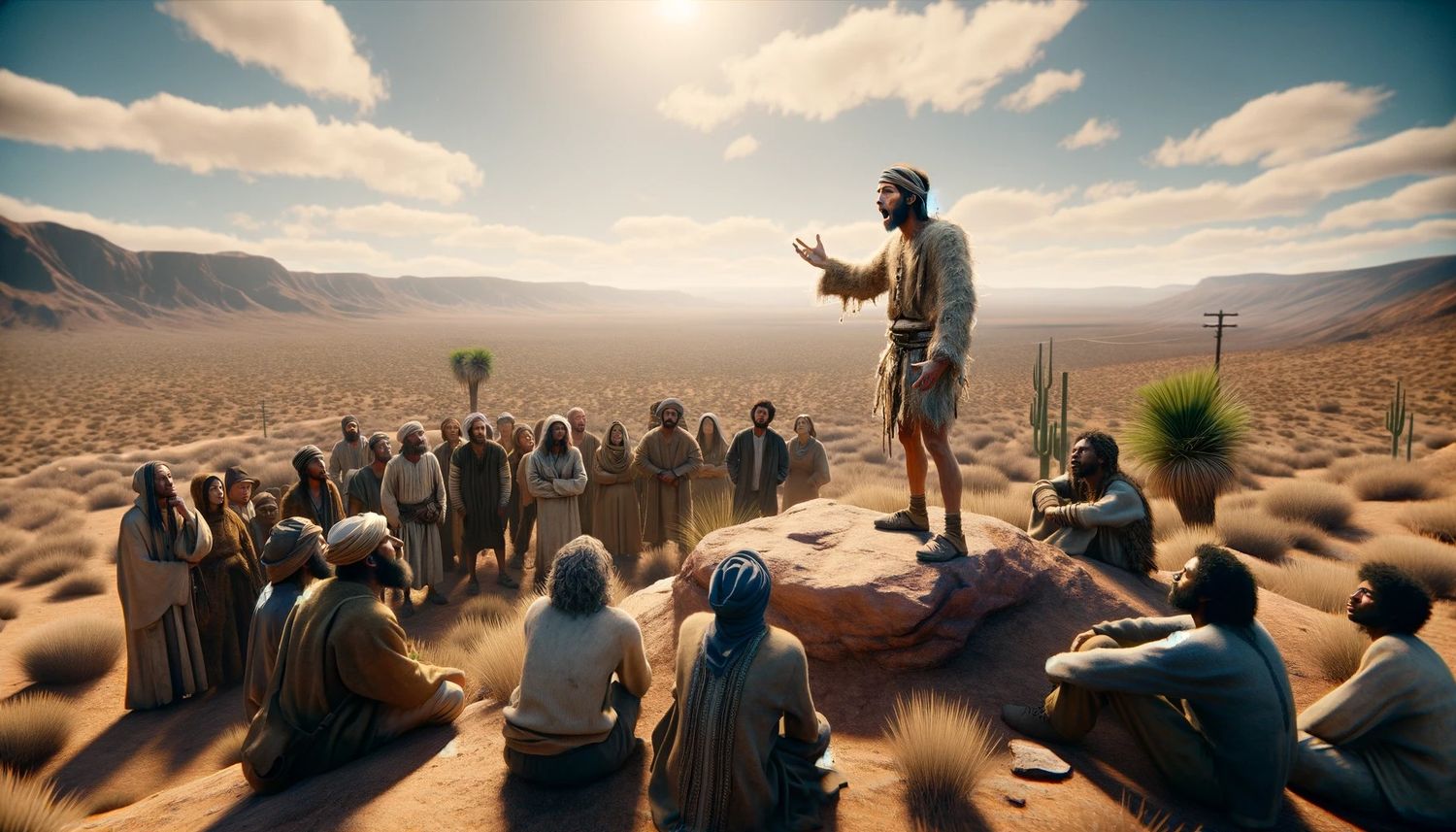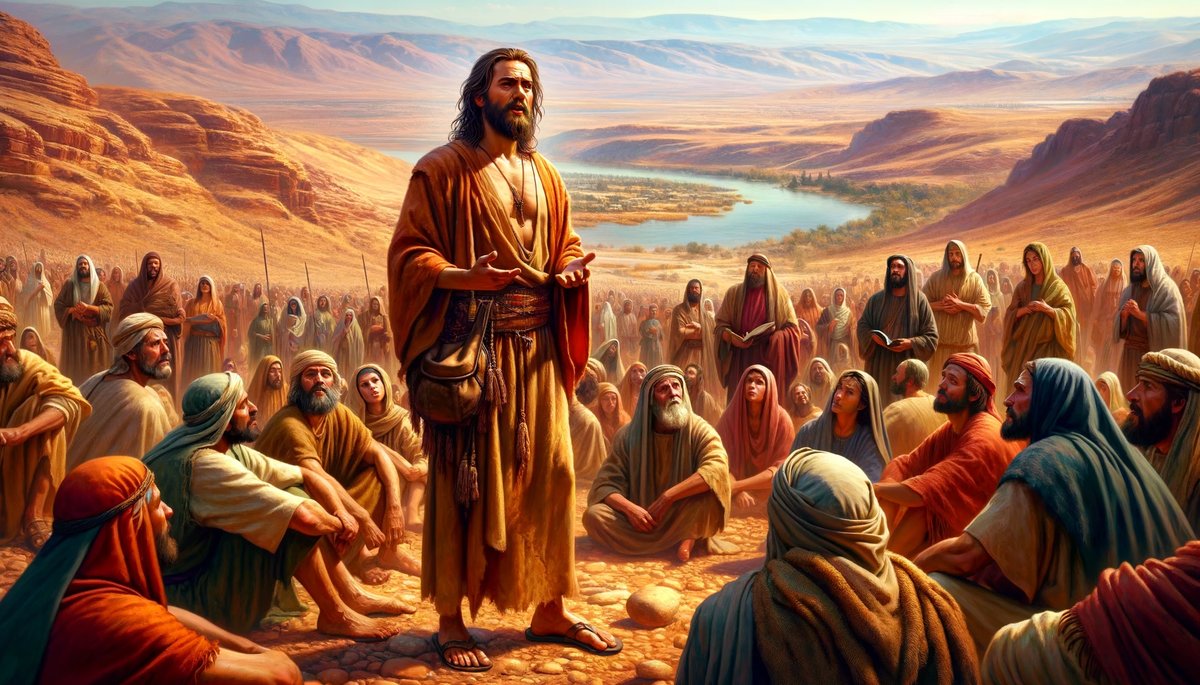Home>Christian Videos>Bible Stories>What Type Of Insect Did John The Baptist Eat In The Desert


Bible Stories
What Type Of Insect Did John The Baptist Eat In The Desert
Published: March 6, 2024
Jason DeRose, Managing Editor at Christian.net, uses his expertise in religion and journalism to deepen understanding of faith's societal impacts. His editorial leadership, coupled with a strong academic background, enriches the platform’s diverse content, earning him recognition in both journalism and religious circles.
Discover the intriguing story of John the Baptist and the insect he ate in the desert. Explore this fascinating Bible story and its significance.
(Many of the links in this article redirect to a specific reviewed product. Your purchase of these products through affiliate links helps to generate commission for Christian.net, at no extra cost. Learn more)
Table of Contents
The Dietary Habits of John the Baptist
John the Baptist, a central figure in Christianity, is known for his unique dietary habits, particularly his consumption of locusts and wild honey. His diet has sparked curiosity and intrigue, prompting many to question the nature of his culinary choices. In the biblical narrative, John the Baptist's diet is mentioned in the Gospel of Matthew, where it is stated that "his food was locusts and wild honey" (Matthew 3:4). This revelation raises the question: What type of insect did John the Baptist eat in the desert?
John the Baptist's dietary habits were unconventional by contemporary standards, yet they held significant cultural and religious symbolism. His choice to consume locusts and wild honey reflected a lifestyle of simplicity and austerity, aligning with his role as a humble and ascetic prophet. In the context of the desert environment where John the Baptist resided, his diet was a testament to his ability to sustain himself with minimal resources, emphasizing his detachment from worldly comforts and material possessions.
John the Baptist's dietary habits also exemplify the concept of purity and natural sustenance. By partaking in a diet consisting of locusts and wild honey, he embraced a lifestyle that was free from excess and artificial indulgence. This deliberate choice of sustenance conveyed a message of spiritual devotion and discipline, emphasizing the importance of inner purity and detachment from earthly temptations.
The significance of John the Baptist's dietary habits extends beyond mere sustenance; it serves as a powerful symbol of his unwavering commitment to his divine calling. His consumption of locusts and wild honey exemplifies his willingness to embrace a life of sacrifice and self-denial, prioritizing spiritual fulfillment over worldly comforts. This aspect of his character is integral to understanding his role as a forerunner to Jesus Christ, emphasizing the virtues of humility, self-discipline, and unwavering faith.
In essence, John the Baptist's dietary habits offer a profound insight into his character and spiritual mission. His choice to consume locusts and wild honey transcends mere culinary preferences; it embodies a deeper significance rooted in spiritual devotion, simplicity, and unwavering commitment to his divine purpose. This aspect of his life serves as a compelling example of the transformative power of faith and the profound impact of living in accordance with one's spiritual calling.
Read more: What Does John The Baptist Eat
The Culinary Delights of the Desert
The desert, with its harsh and unforgiving terrain, may not be the first place that comes to mind when one thinks of culinary delights. However, for John the Baptist, the desert was not only his dwelling place but also the source of his sustenance. In the biblical narrative, the desert is depicted as a setting of spiritual revelation and transformation, where individuals, including John the Baptist, sought solace and divine guidance. Amidst the arid landscape and scorching heat, John the Baptist found sustenance in the most unlikely of places, embracing a diet that was both unconventional and deeply symbolic.
In the desert, where resources were scarce and survival was a daily struggle, John the Baptist's dietary choices took on a profound significance. His consumption of locusts and wild honey was not merely a matter of sustenance; it was a reflection of his resilience and resourcefulness in the face of adversity. The desert, with its vast expanse and extreme conditions, became the backdrop for John the Baptist's spiritual journey, shaping not only his character but also his dietary habits.
The culinary delights of the desert, as experienced by John the Baptist, were a testament to the resilience of the human spirit and the ability to find sustenance in the most unlikely of places. His diet, consisting of locusts and wild honey, exemplified a profound connection to the natural world, where survival depended on adaptability and resourcefulness. In this harsh and unforgiving environment, John the Baptist's dietary choices were a reflection of his ability to thrive amidst adversity, embodying a spirit of resilience and unwavering faith.
The desert, with its stark beauty and formidable challenges, served as the backdrop for John the Baptist's unique culinary journey. His consumption of locusts and wild honey in this setting was a powerful testament to the transformative power of faith and the ability to find sustenance, both physical and spiritual, in the most unexpected of places. In the culinary delights of the desert, John the Baptist's story offers a compelling narrative of resilience, resourcefulness, and unwavering commitment to his divine calling.
Locusts and Wild Honey: A Unique Diet Choice
John the Baptist's consumption of locusts and wild honey represents a truly unique and unconventional dietary choice. In the context of his time, this combination of sustenance was far from the norm, challenging conventional culinary practices and societal expectations. The consumption of locusts, a type of grasshopper, was particularly unconventional, as it was not a staple in the diets of most individuals. However, for John the Baptist, this dietary choice held profound symbolic and cultural significance, transcending mere culinary preferences.
The consumption of locusts and wild honey was a reflection of John the Baptist's commitment to a life of simplicity and austerity. In choosing to consume these unconventional foods, he embraced a lifestyle that was devoid of excess and indulgence, aligning with his role as a humble and ascetic prophet. His diet was a testament to his ability to find sustenance in the most unlikely of places, emphasizing his detachment from worldly comforts and material possessions.
Furthermore, the choice of locusts and wild honey as dietary staples conveyed a message of purity and natural sustenance. In a time where processed and extravagant foods were not uncommon among the privileged, John the Baptist's diet stood in stark contrast. By partaking in a diet consisting of locusts and wild honey, he demonstrated a commitment to purity and simplicity, emphasizing the importance of inner purity and detachment from earthly temptations.
The consumption of locusts and wild honey also carried significant cultural and religious symbolism. In the biblical context, both locusts and honey held symbolic value, representing renewal, sustenance, and the bounty of the natural world. The consumption of these foods was not merely a matter of sustenance; it was a reflection of John the Baptist's deep spiritual connection to the natural world and his unwavering faith in divine providence.
In essence, John the Baptist's choice to consume locusts and wild honey was far more than a dietary preference; it was a reflection of his character, values, and unwavering commitment to his spiritual calling. This unique diet choice serves as a powerful testament to the transformative power of faith and the profound impact of living in accordance with one's spiritual convictions.
The Nutritional Value of Locusts
Locusts, often perceived as unconventional and unappealing in many culinary contexts, possess surprising nutritional value. Despite their reputation as pests in agricultural settings, locusts are a rich source of protein, essential amino acids, and micronutrients. In fact, they have been a traditional food source in various cultures throughout history, valued for their nutritional density and sustainability. Locusts are known to contain high levels of protein, making them a valuable dietary component, especially in environments where alternative protein sources are scarce. Additionally, locusts are rich in essential amino acids, such as lysine and leucine, which are crucial for overall health and well-being. Furthermore, locusts provide significant amounts of micronutrients, including iron, zinc, and B vitamins, contributing to a well-rounded and nourishing dietary intake. In the context of John the Baptist's diet, the nutritional value of locusts underscores the resourcefulness and adaptability required for sustenance in the desert environment, while also highlighting the potential health benefits associated with consuming this unconventional yet nutrient-dense food source.
The Significance of John the Baptist's Diet in Biblical Context
John the Baptist's diet holds profound significance within the biblical narrative, serving as a powerful symbol of his spiritual mission and unwavering commitment to his divine calling. In the context of the Bible, dietary practices often carry symbolic and cultural weight, reflecting an individual's spiritual devotion and alignment with divine principles. John the Baptist's choice to consume locusts and wild honey was not merely a matter of sustenance; it was a deliberate and symbolic expression of his character and spiritual values.
The consumption of locusts and wild honey in the biblical context carries multifaceted symbolism. Locusts, as unconventional as they may seem as a food source, held cultural and religious significance in the ancient Near East. In the Old Testament, locusts were associated with divine judgment and devastation, often depicted as instruments of God's wrath. However, in the context of John the Baptist's diet, the consumption of locusts took on a different connotation. It symbolized a departure from traditional norms and a rejection of worldly indulgence, emphasizing a life of simplicity and spiritual devotion.
Furthermore, the inclusion of wild honey in John the Baptist's diet carries its own symbolic weight. Honey, throughout the Bible, is often associated with abundance, sweetness, and the richness of the Promised Land. Its presence in John the Baptist's diet serves as a reminder of God's provision and the spiritual nourishment derived from a life lived in alignment with divine principles. The combination of locusts and wild honey, therefore, represents a harmonious balance between austerity and divine sustenance, reflecting John the Baptist's unwavering commitment to his spiritual mission.
In addition to its symbolic significance, John the Baptist's diet underscores the theme of preparation and anticipation within the biblical narrative. As the forerunner to Jesus Christ, John the Baptist's ascetic lifestyle and dietary choices served as a prelude to the transformative message of Christ's ministry. His diet symbolized a period of spiritual preparation and purification, aligning with the prophetic tradition of heralding the coming of a significant spiritual figure.
Ultimately, the significance of John the Baptist's diet in the biblical context extends beyond mere culinary preferences; it embodies a deeper spiritual and cultural symbolism. His consumption of locusts and wild honey serves as a testament to his unwavering faith, humility, and dedication to his divine calling, offering a compelling example of the transformative power of faith and the profound impact of living in accordance with one's spiritual convictions.















